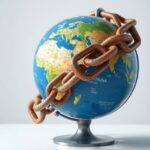Argentina Follows U.S. in Withdrawal from World Health Organization
Argentina will exit the World Health Organization, a decision influenced by President Javier Milei’s administration, which cites disagreements over health management during the COVID-19 pandemic. This move follows the U.S. withdrawal from the WHO and aligns with Milei’s admiration for former President Trump, raising concerns about the future of global health funding.
Argentina has announced its intention to withdraw from the World Health Organization (WHO), following the recent exit of the United States from the same agency. President Javier Milei’s administration cited significant disagreements over health management, particularly concerning the COVID-19 pandemic, as the primary reason for this decision. According to spokesman Manuel Adorni, Argentina seeks to protect its sovereignty and will not allow external entities to interfere in its domestic policies.
President Milei’s approach also aims to enhance Argentina’s ability to customize health policies that are contextually relevant while ensuring that local resources are utilized efficiently. This shift toward a more autonomous health strategy aligns with Milei’s self-identification as an “anarcho-capitalist” and his admiration for former U.S. President Donald Trump, who initiated America’s withdrawal from the WHO shortly after taking office. Trump’s criticisms of the WHO’s pandemic response further underscore the ideological alignment between the two leaders.
The departure of Argentina from the WHO raises concerns regarding the potential impacts on global health initiatives, especially considering that the United States was the largest financial contributor to the organization. Trump’s assertions of being “ripped off” by the WHO highlight the contentious relationship that the United States had with the agency, which might have broader implications for international funding in public health.
The recent announcement from Argentina marks a significant political shift as it joins the United States in distancing itself from the World Health Organization. This move comes amid ongoing debates about the role of international organizations in national health policy, particularly following the global challenges posed by the COVID-19 pandemic. The relationship between national sovereignty and international health management remains a contentious issue, with differing perspectives shaping the policies of nations worldwide.
In conclusion, Argentina’s decision to withdraw from the WHO reflects a broader trend of prioritizing national sovereignty over international collaboration in health matters. As nations grapple with the lessons learned from the pandemic, the implications of such exits on global health resources and cooperative efforts will require careful observation. The alignment of President Milei’s views with those of Donald Trump further emphasizes the ideological rift that is influencing contemporary health governance.
Original Source: www.scmp.com








Post Comment